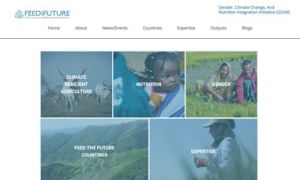Since Amartya Sen's famous work on Poverty and Famines, economists have understood that the impacts of food market shocks on the poor depend much more on their impacts on households’ incomes and access to food than on overall food availability, an
Search
Rapid urban growth is straining infrastructures, economies, and food security of cities in sub-Saharan Africa (SSA). Amid competing issues of sanitation, housing, and unemployment, planning for urban food security receives less attention.
In many developing countries, food environments are changing rapidly, with modern retailers—such as supermarkets—gaining in importance. Previous studies have suggested that the rise of modern retailers contributes to overweight and obesity.
From bad to worse: Poverty impacts of food availability responses to weather shocks in Zambia
Since Amartya Sen’s famous work on Poverty and Famines, economists have understood that policy responses to food market shocks should be guided by changes in households’ incomes and access to food, rather than by overall food availability.
The role of risk in the context of climate change, land use choices and crop production: Evidence from Zambia
Most of the studies that investigate the impacts of climate change on agriculture have concentrated on the effects of changes in mean temperature and precipitation even though the importance of volatility and risk on farmers’ decision making is we
Climate change and developing country growth: The cases of Malawi, Mozambique, and Zambia
We consider the interplay of climate change impacts, global mitigation policies, and the economic interests of developing countries to 2050.
Dietary intake patterns among lactating and non-lactating women of reproductive age in rural Zambia
Insufficient dietary intake, micronutrient deficiencies, and infection may result in malnutrition. In Zambia, an estimated 14% of women are vitamin A-deficient, ~50% are anemic, 10% are underweight, and 23% are overweight/obese.
Economy-wide implications of biofuel production in Zambia
Potential biofuel demand in South Africa is estimated to increase to 1550 million litres by 2025 due to mandatory blending rates. Land and water constraints, however, limit the ability for domestic production.
Pesticide use in Sub-Saharan Africa: Estimates, projections, and implications in the context of food system transformation
The purpose of this paper is to characterize pesticide use in developing Sub-Saharan Africa (dSSA) in the context of urbanization, income growth, and food system change.
Assessment of El Niño impacts and grain trade policy responses in East and Southern Africa
This study analyzes recent household data on Malawi, Tanzania, and Zambia to assess the impact of the most recent El Niño in East and Southern Africa and the trade policy responses to it.
What it takes: Evidence from a nutrition- and gender-sensitive agriculture intervention in rural Zambia
The Realigning Agriculture for Improved Nutrition (RAIN) project was designed to address child undernutrition through a multisectoral approach which integrated agricultural diversification to improve access to nutritious foods, the promotion of ge
The kaleidoscope model of policy change: Applications to food security policy in Zambia
What drives policy reform after long periods of policy inertia? What factors shape the effectiveness of policy implementation following reform decisions?
Using natural areas and empowering women to buffer food security and nutrition from climate shocks: Evidence from Ghana, Zambia, and Bangladesh
As climate change makes precipitation shocks more common, policymakers are becoming increasingly interested in protecting food systems and nutrition outcomes from the damaging effects of droughts and floods (Wheeler and von Braun, 2013).

